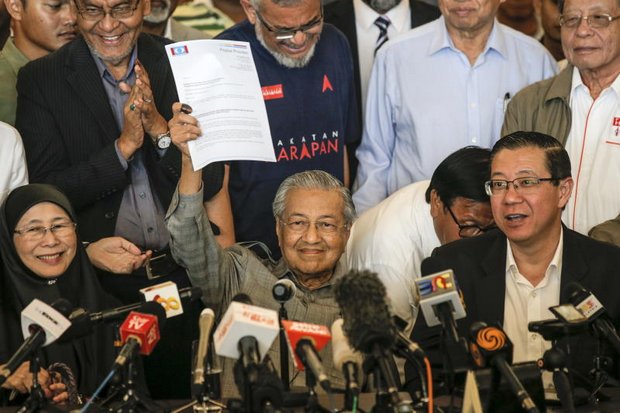
The Malaysian electorate's vote to install opposition leader Mahathir Mohamad as prime minister for a second time, in which the 92-year-old defeated his protege-turned-rival Najib Razak, should serve as both a lesson and a warning for the Thai military regime, academics and politicians say.
Chulalongkorn University political scientist Surachart Bamrungsuk said all parties in Thailand, including the National Council for Peace and Order, should take note that a corrupt and inefficient administration can be held to account come election time, even when the odds appear to be stacked in its favour -- as was the case in Malaysia where Mr Najib led the opinion polls in the run-up to the vote.
"Corruption is a big issue that comes up whenever people think about outgoing prime minister Najib. And while the Malaysian government has in the past been seen as very efficient, complaints have surfaced recently about how inefficient it has become," Mr Surachart said.

Mr Najib has been embroiled in an embezzlement scandal involving his country's 1Malaysia Development Berhad (1MDB). The Thai junta has also faced allegations of corruption since it rose to power through a coup in 2014.
"Pro-democracy groups can also learn from the political developments in Myanmar and Malaysia," he said, adding that Myanmar's military recently ceded power to the National League for Democracy, a civilian-led party.
The Barisan Nasional, led by Mr Najib's United Malays National Orgnisation (Umno), was swept out of power on Wednesday by Dr Mahathir's Pakatan Harapan.
Official results showed Dr Mahathir's opposition coalition won 121 parliamentary seats, a handsome victory as it only needed 112 to form a government.
The ruling BN won only 79 seats, down from 133 in the last poll.
Akarapong Khamkhoon, a lecturer at Thammasat University's Pridi Banomyong International College, said the opposition's victory was partly due to the political clout Dr Mahathir still wields.
He emphasised that stamping out corruption, and much of the victory -- which was announced early Thursday morning -- can probably be attributed to Dr Mahathir's charm as well as his political experience and savvy, Mr Akarapong said.
He said the issue had a great impact on the election result as Mr Najib's government faced allegations of widespread corruption.
Despite this, only Dr Mahathir -- who helped put Mr Najib in office -- was able to take him down, Mr Akarapong added.
Yutthaporn Issarachai, a political scientist at Sukhothai Thammathirat Open University, saw rising discontent over Malaysia's economic problems as a decisive factor leading to the defeat of Mr Najib's government.
He noted that politicians around the world often capitalise on claims of corruption to attack their political rivals, as has been the case in Thailand.

As for the Prayut Chan-o-cha government, Mr Yutthaporn said that if Gen Prayut wants to return to power after the next election, he is likely to face criticism over his administration's handling of the economy during its tenure, as well as questions over his government's "half-hearted" fight against corruption.
Democrat Party leader Abhisit Vejjajiva said the poll results reflected public sentiment and that voters saw their government was plagued by graft.
"This is a lesson for everyone. It shows that if there is something the people can't accept, it will eventually be reflected [in the poll results]. I don't think this only applies to Malaysia or Thailand but all countries," he said.
Asked if Thailand could experience a similar situation when the general election rolls around, Mr Abhisit, himself a former prime minister, said: "I don't know because it is still not known when the election will be held. But this is a lesson about people's frustration and discontent."
Gen Prayut has said the poll will be held by next February but no date has been fixed and critics point to previous delays as indicating the deadline may not be met.
Pheu Thai Party acting secretary-general Phumtham Wechayachai also weighed in on the matter.
"The moral of Malaysia's election results is that it does not matter how much power a government holds, or how long it is in power, as was the case with the Umno," he said. The Umno held power for over six decades until this week.
"The people will decide against you if you do not win their hearts and fail to run the country in a way that responds to their needs."
Clearly referring to Thailand, he said a government that had "seized" power and run a country for four years without acting in a transparent way while also facing numerous allegations of corruption "could not satisfy the public".
Fugitive ex-prime minister Thaksin Shinawatra issued a Facebook post extending his congratulations to Dr Mahathir.
"From my experience of having had the honour of working closely with him, I am confident he will lead the Alliance of Hope and Malaysia into a successful future," he wrote.
- World's oldest leader: Mahathir sworn in by king
- Exclusive interview: When Mahathir spoke up
- EDITORIAL: An election of hope
- Editor's Commentary: A model for Southeast Asia
- Thitinan's analysis: Ramifications for Thailand
- Business optimistic: More trade likely
